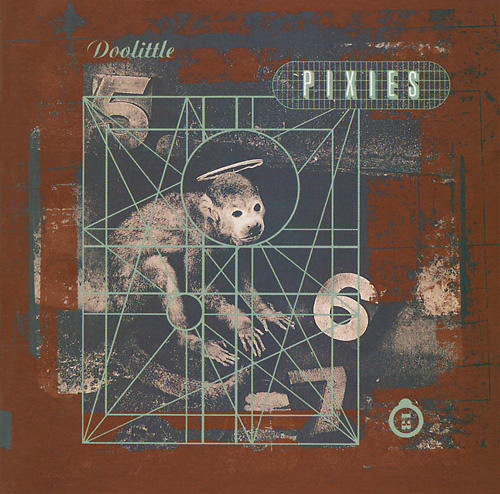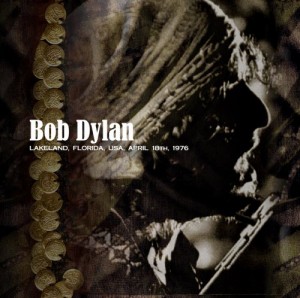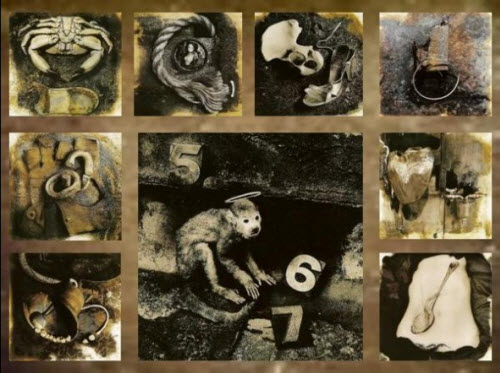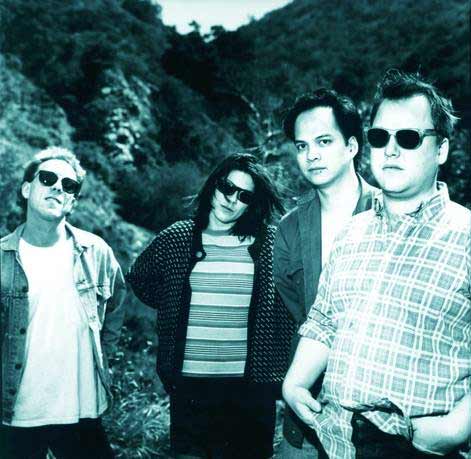 |
|
April 18: Pixies released Doolittle in 1989
Debaser (official video):
Wikipedia:
| Released | April 18, 1989 |
|---|---|
| Recorded | October 31 – November 23, 1988 at Downtown Recorders in Boston, Massachusetts and Carriage House Studios in Stamford, Connecticut |
| Genre | Alternative rock |
| Length | 38:38 |
| Label | 4AD, Elektra (initial U.S. distribution) |
| Producer | Gil Norton |
Doolittle is the second studio album from the American alternative rock band Pixies, released in April 1989 on 4AD. The album’s offbeat and dark subject material, featuring references to surrealism, Biblical violence, torture and death, contrasts with the clean production sound achieved by the newly hired producer Gil Norton. Doolittle was the Pixies’ first international release, with Elektra Records acting as the album’s distributor in the United States and PolyGram in Canada.
Pixies released two singles from Doolittle, “Here Comes Your Man” and “Monkey Gone to Heaven”, both of which were chart successes on the US chart for Modern Rock Tracks. The album itself reached number eight on the UK Albums Chart, an unexpected success for the band. In retrospect, album tracks such as “Debaser”, “Wave of Mutilation”, “Monkey Gone to Heaven”, “Gouge Away”, and “Hey” are highly acclaimed by critics, while the album, along with debut LP Surfer Rosa, is often seen as the band’s strongest work.
Doolittle has continued to sell consistently well in the years since its release, and in 1995 was certified gold by the Recording Industry Association of America. The album has been cited as inspirational by many alternative artists, while numerous music publications have ranked it as one of the most influential albums ever. A 2003 poll of NME writers ranked Doolittle as the second-greatest album of all time, and Rolling Stone placed the album at 226 on its list of “The 500 Greatest Albums of All Time”.
Here comes your man (official video):
Music:
Doolittle features an eclectic mix of musical styles. While tracks such as “Tame” and “Crackity Jones” are fast and aggressive, and incorporate the band’s trademark loud–quiet dynamic, other songs such as “Silver”, “I Bleed”, and “Here Comes Your Man” reveal a quieter, slower and more melodic temperament. With Doolittle, the band began to incorporate further instruments into their sound; for instance, “Monkey Gone to Heaven” features two violins and two cellos. Several tracks on Doolittle are constructed around simple repeating chord progressions.
“Tame” is based on a three chord formula; including Joey Santiago’s playing a “Hendrix chord” over the main bass progression. “I Bleed” is melodically simple, and is formed around a single rhythmical repetition. Some songs are influenced by other genres of music; while “Crackity Jones” has a distinctly Spanish sound, and incorporates G♯ and A triads over a C♯ pedal, the song’s rhythm guitar, played by Francis, starts with an eighth-note downstroke typical of punk rock music.
Tame (live, Brixton academy, 1991):
Accolades:
| Publication | Country | Accolade | Year | Rank |
|---|---|---|---|---|
| Hot Press | Ireland | Top 100 Albums |
2006 | #34 |
| Juice | Australia | The 50 Best Albums of All Time |
1997 | #2 |
| NME | UK | 100 Best Albums |
2003 | #2 |
| Panorama | Norway | The 30 Best Albums of the Year 1970–98 | 1999 | #1 |
| Pitchfork Media | US | Top 100 Albums of the 1980s |
2002 | #4 |
| Q | UK | Ultimate Music Collection |
2005 | * |
| Rolling Stone | US | The 500 Greatest Albums of All Time | 2005 | #226 |
| Spin | US | 100 Greatest Albums, 1985–2005 |
2005 | #36 |
| Slant Magazine | US | Best Albums of the 1980s |
2012 | #34 |
Tracks:
All tracks were written by Black Francis, except where noted.
- “Debaser” – 2:52
- “Tame” – 1:55
- “Wave of Mutilation” – 2:04
- “I Bleed” – 2:34
- “Here Comes Your Man” – 3:21
- “Dead” – 2:21
- “Monkey Gone to Heaven” – 2:56
- “Mr. Grieves” – 2:05
- “Crackity Jones” – 1:24
- “La La Love You” – 2:43
- “No. 13 Baby” – 3:51
- “There Goes My Gun” – 1:49
- “Hey” – 3:31
- “Silver” (Francis/Deal) – 2:25
- “Gouge Away” – 2:45
Monkey Gone To Heaven:
Personnel:
- Pixies
- Black Francis – vocals, rhythm guitar
- Kim Deal – bass guitar, vocals, slide guitar on “Silver”
- Joey Santiago – lead guitar
- David Lovering – drums, lead vocal on “La La Love You”, bass guitar on “Silver”
- Additional musicians
- Arthur Fiacco – cello on “Monkey Gone to Heaven”
- Karen Karlsrud – violin on “Monkey Gone to Heaven”
- Corine Metter – violin on “Monkey Gone to Heaven”
- Ann Rorich – cello on “Monkey Gone to Heaven”
- Production
- Steve Haigler – mixing engineer
- Matt Lane – assistant engineer
- Simon Larbalestier – cover image, album booklet imagery
- Gil Norton – production, engineering
- Vaughan Oliver – album booklet imagery
- Dave Snider – assistant engineer
- Published by Rice ‘n’ Beans Music BMI
Playlist of the day:
Other April 18:
- Clarence “Gatemouth” Brown (April 18, 1924 — September 10, 2005) was an American musician from Louisiana and Texas. He is best known for his work as a blues musician, but embraced other styles of music, having “spent his career fighting purism by synthesizing old blues, country, jazz, Cajun music and R&B styles” His work also encompasses rock and roll, rock music,folk, electric blues, and Texas blues.
Birth name Clarence Brown Also known as Gatemouth, Gate Born April 18, 1924
Vinton, Louisiana, United StatesDied September 10, 2005 (aged 81)
Orange, Texas, United StatesGenres Blues, swing, country, cajun, R&B, rock, folk, electric blues, Texas blues
Occupations Musician Instruments vocals, guitar, violin, viola, mandolin, drums, harmonica, piano Years active 1947–2005 - Bob Dylan startet “Rolling Thunder 2” with a concert @ Lakeland, Florida in 1976.
Check this post: Bob Dylan – Civic Center – Lakeland, Florida – 18 April 1976

- Let Love In is the eighth studio album by Nick Cave and the Bad Seeds, released on 18 April 1994 on Mute Records.
Released 18 April 1994 Recorded September–December 1993 Genre Alternative rock Length 45:24 Label Mute Producer Tony Cohen
-Egil & Hallgeir






